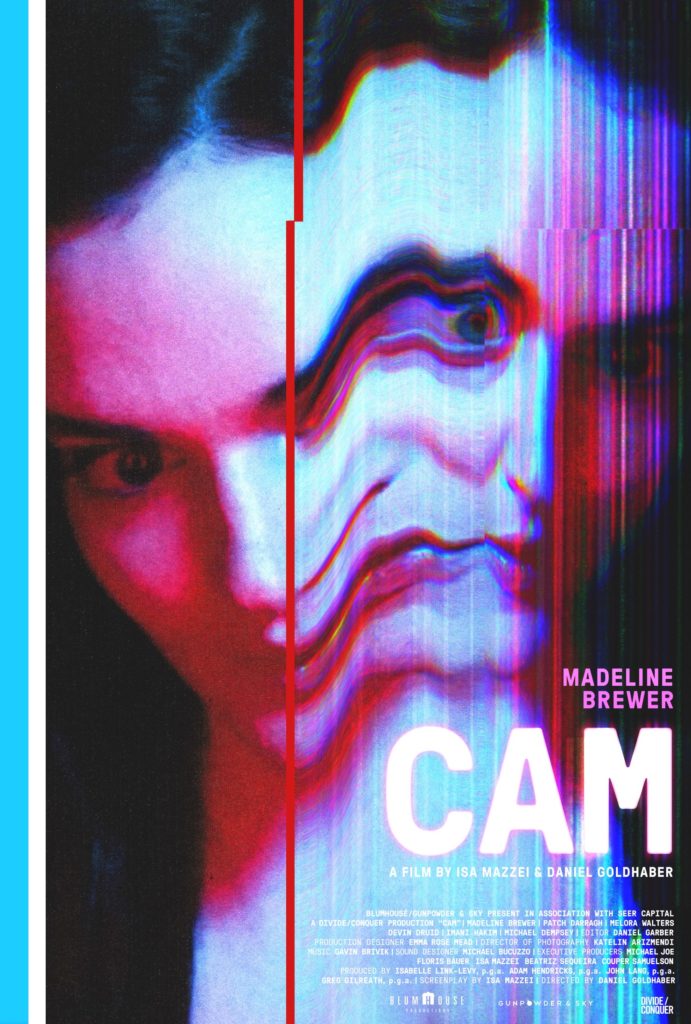
The following contains major plot spoilers for CAM.
At the intersection of feminism, porn, and fake news is a horror film so zeitgeist-y — and effective — it should be on every cinephile’s year-end list. Unfortunately, the film’s gutsy message is lost on a mainstream audience that customarily rejects any form of sex work as a legitimate path for employment or self-expression, let alone a desirable one.
The film is CAM, a deep dive into the life of Alice (Madeline Brewer), an ambitious camgirl and rising star on the porn webcam site FreeGirlsLive. When we meet her, Alice has already managed to scrape her way up the website’s rankings from #100,000-something to nearly breaking into the top fifty most popular girls. We soon learn she’s nearly reached this milestone through meticulous planning and testing of her video content (which can include anything from eating a steak dinner in lingerie to masturbating with a vibrator chosen by her viewers), and by offering increasingly “crazy” shows. In CAM’s opening scene, Alice pretends to slit her own throat in order to satisfy the demands of one anonymous (planted) viewer, resulting in her ranking shooting from #65 to #53. Meanwhile, an unceasing chorus of message alerts plays in the background, signifying the tips pouring in from enthusiastic viewers.
Written by Isa Mazzei, a former camgirl herself, CAM is a true rarity: A film that empowers sex workers, while refusing at every turn to baby or reassure an audience that is largely unfamiliar with the world of legal sex work. It’s a needed change from the way sex workers are most often depicted onscreen — as amoral, lazy, or damaged.
On the contrary, Alice not only excels at her job through hard work; she also genuinely enjoys it. A little anxious and always dressed down when she’s offline, Alice comes alive in front of the camera, slipping effortlessly into the skin of her charming and bubbly alter ego, Lola. As Lola, she confidently acts as entertainer, actress, and girlfriend to her many clients. She relishes the challenge of designing wild, creative shows and competing with other women for the attention of the most coveted clients.
CAM pushes back against the idea that sex work isn’t real work. Alice not only has to plan and produce all her own content, buy her own costumes and props, and maintain her appearance; she also struggles against girls who are able to work longer hours and an audience that never stops demanding more. At one point Alice laments of her ranking, “I’m down to 55. How am I supposed to hold my spot — not sleep?” CAM subtly indicts a culture that consumes “content” at an unrelenting pace, but whether on YouTube or YouPorn, is ruthlessly fickle and even resentful of the very people providing the entertainment.
But all of these are problems familiar to any millennial currently surviving the gig economy — the real trouble doesn’t begin until Alice achieves her goal of hitting Top 50. As her notoriety increases, she becomes a target for a virus that covertly takes over popular camgirls’ accounts and replaces them with an exact replica of themselves. (The technology behind the replicas is never spelled out, but it’s easy enough to imagine: “Deepfake” technology, which combines and superimposes videos or images onto other videos or images, has already been used to create unnervingly realistic fake porn videos of celebrities, for example.) The real women are shut out of their accounts, unable to make money off their own likenesses — or forced to start all over again with a new account and a bottom-of-the-barrel ranking — while the computer-generated versions spout automated language at viewers who aren’t savvy enough to tell the difference, or just don’t care.
Faced with losing all control over her likeness and the business she’s built, Alice challenges the replica-Lola to a contest to determine who is the “better” Lola. Alice proves she’s more “real” (authenticity being like gold on the internet) than the replica-Lola, in a gory climax that allows her to get her password back and delete the account. To the surprise of many viewers, however, the film ends not with Alice repenting and applying for an office job; instead, she creates a new account and returns to the camming business.
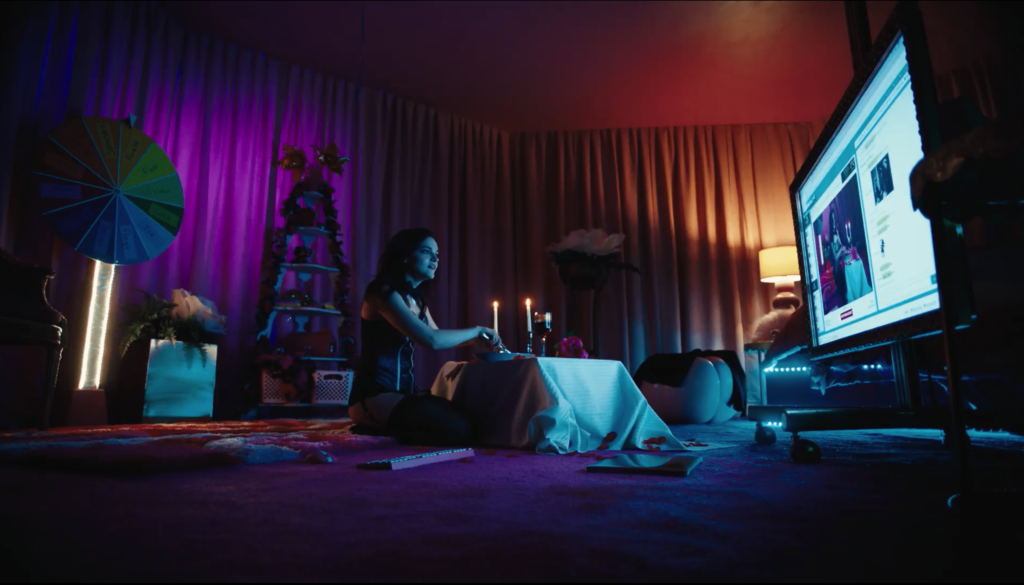
Screenwriter Mazzei and director Daniel Goldhaber have been candid in numerous interviews about the pushback they received from studios and audiences, both of which favored a “morality tale” ending that would make Alice’s story more palatable to the widest range of people. Mazzei has also recounted numerous times that friends or audiences praised the film for its progressive attitude towards sex workers while in the same breath lauding Mazzei for “getting out” of the sex work industry, as if it wasn’t something she enjoyed doing by choice.
Based on the widespread reluctance or inability of audiences to see sex work as legitimate, let alone empowering, it’s not hard to understand why Alice keeps her job a secret from most of the people in her life. The film itself shows repeatedly how sex workers are shamed and pushed to the margins by mainstream society. When Alice calls the police to report her likeness being stolen and used against her will, the police can’t even begin to fathom her job, let alone respect her right to do it. Instead of helping her, they make insinuations about her line of work while implying that she’s getting what she deserves. “You don’t wanna see stuff like this? Get off the internet,” says one of the cops, entirely failing to grasp the problem.
When Alice is outed as a camgirl at her younger brother’s birthday party, damage caused by the stigma surrounding sex work is once again evident. Alice’s job is legal, she works hard at it, and it allows her to be self-reliant, but because she trades in sex, her work is automatically invalidated. Alice is shunned from the party for how she chooses to express herself and make a living, despite her success. Later, someone spraypaints the words “WHORE HOUSE” on the side of Alice’s mother’s home.
These reactions are indicative of a pervasive attitude in American culture: that it’s okay to discretely consume porn, and it’s sometimes okay to admit you consume porn, but it’s never okay to admit you make porn. And if you do admit to making porn, you should be trying to get out of the business, if you want to be treated like a human. Ironically, supply-and-demand dictates that sex workers will likely always exist, even though much of society (while browsing PornHub in an incognito window) prefers to pretend they don’t.
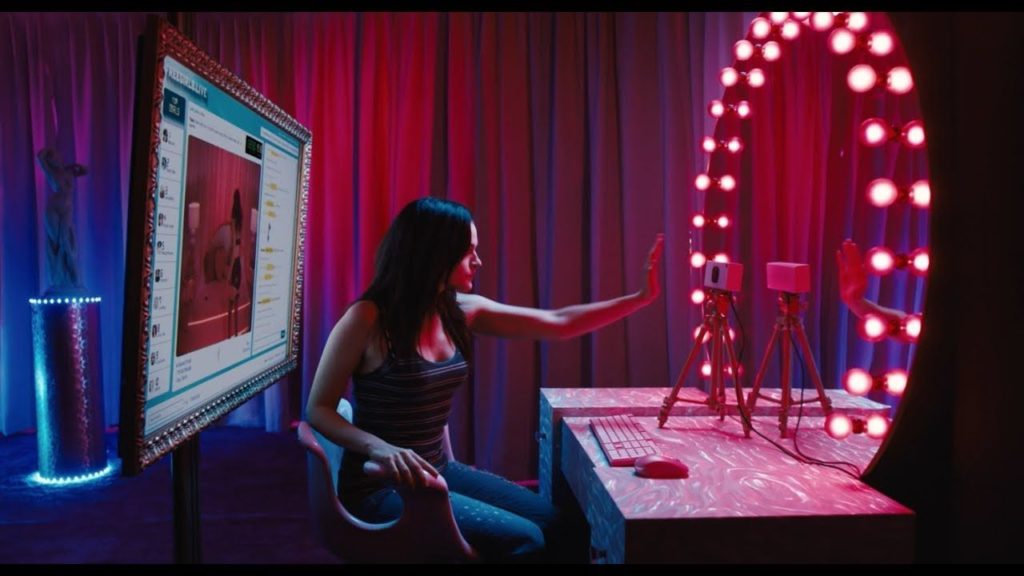
CAM bucks all expectations and refuses to fall into this trap. Alice’s choice to return to camming, a little wiser to its tricks and more determined than ever to succeed, is framed as if she were returning to any other field of work. When someone asks her what she’ll do if her account is stolen again, Alice replies, “Then I’ll make another. And another and another.” The film is revolutionary for neither discrediting Alice for that choice, nor making her explain it to the audience.
Although she initially balks at the idea, Alice’s mother also comes to respect Alice’s decision to be a camgirl. After watching old videos of Alice’s streams, her mother remarks, “I get you in pajamas, bratty and bored and biting your nails. But on that show, you’re a different person. Confident. I wish everybody could see you like that.” A little later she says, “I’m enlightened, I understand this whole female empowerment thing.” In a world where the porn industry and sex work are so rarely shown onscreen with any depth or compassion, it’s nice to see a camgirl get a little understanding.
Regardless of one’s views on sex work, the $4.9 billion industry is here to stay. 40 billion Americans regularly consume the work of porn performers and camgirls, yet U.S. laws and policies continually fail to take the basic safety of these workers into account, chiefly because mainstream society still views them as second-class citizens. CAM is a small but powerful step towards better representation; it rejects a one-dimensional narrative for sex workers and puts Alice fully in control, allowing her to be a multifaceted person who is intelligent, resilient, and above all, human.
CAM is currently streaming on Netflix. For more on the film, check out the Switchblade Sisters episode with Isa Mazzei!
And for more of Claire Holland’s writing, check out her book here!
Tags: Daniel Goldhaber, Devin Druid, Flora Diaz, Horror, Imani Hakim, Isa Mazzei, Isabelle Link-Levy, Jessica Parker Kennedy, Katelin Arizmendi, Madeline Brewer, Melora Walters, Mystery, Patch Darragh, Quei Tann, Samantha Robinson, Thriller

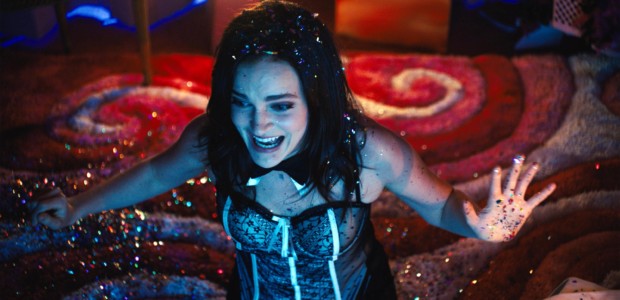
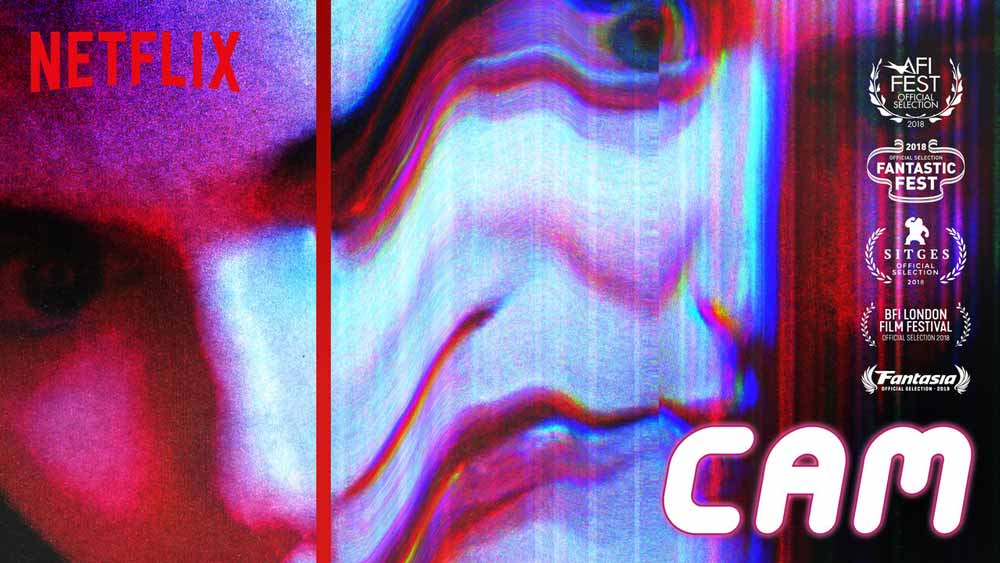
No Comments